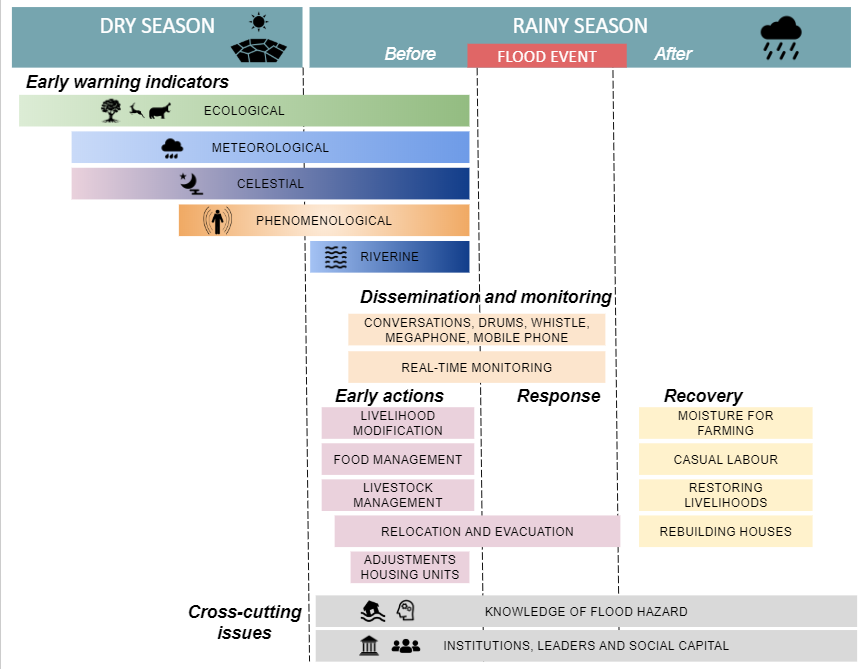Nowadays, it is difficult to imagine any ‘serious’ conversation on disaster risk reduction (DRR) that doesn’t emphasise the importance of local communities, their participation and their local knowledge. Global policies, including the Sendai Framework and Paris Agreement, clearly point out that local knowledge has a role to play in reducing risks and adapting to change. But how is this global rhetoric translated into practical approaches on the ground?
Community-based flood risk management and local knowledge
In my PhD, I investigated the role of local knowledge in community-based flood risk management in the Lower Shire Valley, the most flood prone area of Malawi. This is an area where a lot of development partners are working on building flood resilience through community-based approaches. While engaging with local communities, I found that they often saw what they consider their rich local knowledge disregarded by NGOs and government they work with.
Over the years, people in the Lower Shire Valley have developed a complex knowledge system which cuts across different stages of flood risk management. Members of local communities observe flora and fauna to forecast flooding, develop flood-resilient construction practices, and rely on their social networks and community leaders in times of floods. Most importantly, their knowledge is hybrid, continuously evolving as new layers of understanding are added through continuous experiences of floods, global environmental change, and exposure to ‘modern’ approaches and new technologies brought about by development partners.

I was intrigued. In theory, community-based approaches are our ‘best shot’ at operationalising community participation and inclusion of local knowledge in practice. They are based on participatory approaches, put people at the heart of risk reduction activities, and are based on local needs and realities. Community-based approaches should also be a prime platform for local knowledge and local capacities in DRR. So why is there a mismatch between theory and practice?
Obstacles for the inclusion of local knowledge
The answer is not straightforward. The current setup and practice of community-based flood risk management faces a number of challenges, including problems with funding, governance, sustainability of implemented interventions and limited community participation. This has direct implications on the inclusion of local knowledge. For instance, I found that community-based flood risk management in Malawi often reflects donor funding priorities rather than local needs. These projects are also often short-term and have limited funding. Community participation often becomes merely a box-ticking exercise, failing to facilitate the inclusion of diverse groups and knowledge within a community and failing to account for the inherent heterogeneity within a community.
The most interesting finding is the clear link between the attitudes that those working with communities have towards local knowledge and its lack of inclusion. In rhetoric, practitioners genuinely appear to see the value of, and appreciate, local knowledge. While in practice this is often only the case where it facilitates the introduction of new technologies and external approaches to communities, suggesting that local knowledge is only valuable as a tool to introduce something ‘new’.
Generally, there is a strong divide between local knowledge and what is often referred to as ‘scientific’ or ‘Western’ knowledge. Local knowledge is seen as inferior, and in need of being ‘proven’ or validated by established, scientific methodologies. This indicates that the recognition of local knowledge only goes as far as it fits into technological and scientific modes of understanding.
There is a clear gap in understanding that local knowledge has its own agency and is based on its own epistemology, which is under no circumstances less valid than the ‘Western’ way of knowing.
Looking forward
As experiences from Malawi show, rhetoric on the importance of local knowledge does little to challenge the power imbalance between local and scientific knowledge on the ground, and community-based approaches do not necessarily challenge the status quo.
During my fieldwork I repeatedly found that the best way to boost the role of local knowledge is through its integration with scientific knowledge. Yet, integration is rarely achieved in practice, and what the process would look like is often unclear to practitioners. On the other hand, this integration is not confusing to communities. They are constantly involved in an informal integration process between what is known locally and what is coming from the ‘outside’. For instance, they triangulate their environmental early warning indicators and the official warning information, ultimately making a decision on whether and what action to take.
Going forward, we should identify best practices in informal knowledge integration on the ground. Most importantly, we should be open to learn from the communities and incorporate this learning from the ground. In order to facilitate this shift, funding for community-based projects needs to facilitate a process where ample time and space for an open dialogue would be given, and knowledge co-production would be fostered.
Ultimately, it is necessary to challenge the dominant thinking that local knowledge has less to offer than ‘scientific’ approaches.

Comments